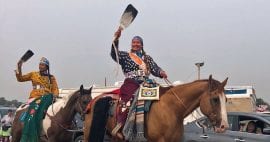
The Crow Tribe secured recognition of its hunting territory in the Fort Laramie Treaty of 1851 and secured the right of its members to hunt within that territory in the Fort Laramie Treaty of 1868. However, for more than a century, the State of Wyoming refused to recognize Crow Tribe treaty hunting rights. The question finally reached the U.S. Supreme Court, which held in 2019 in Herrera v. Wyoming that the Crow Tribe’s off-reservation treaty hunting rights remain intact.
Nevertheless, in the two and a half years since the Supreme Court’s decision, the State has argued that that earlier decisions from lower courts meant that Crow Tribe members could not assert their rights. In effect, the State tried to nullify the Supreme Court’s decision.
On December 3, 2021, the Wyoming District Court for the Fourth Judicial District held that Crow Tribe treaty hunters may assert their treaty rights as a defense to prosecution. The decision from Judge John G. Fenn rightly held that the U.S. Supreme Court’s decision changed the legal landscape, and that the Wyoming could no longer prevent Crow Tribe hunters from asserting their treaty rights based solely on older, lower-court decisions.
Judge Fenn’s decision also held that an earlier court case in which Wyoming argued that it needed to enforce hunting laws against Crow Tribe treaty hunters for conservation purposes no longer applies because of the passage of time and changes in those hunting laws. If Wyoming wants to continue to prosecute Crow Tribe hunters in the Bighorn National Forest, it will need to prove either that he was hunting in a part of the Forest that was “occupied” for purposes of the relevant treaties, or that enforcement of Wyoming’s laws is still required for conservation purposes (or both).

Crow District Princess in Elk Tooth Dress,
Crow Fair 2018
“This obviously is a big win for the Crow Tribe, and for the continued vitality of treaty hunting,” said NARF Staff Attorney Dan Lewerenz, who represented the Crow Tribe as an amicus curiae in this case. “We sincerely hope that this is the end of the story—that the State of Wyoming will not appeal, but instead will give the Crow Tribe and its treaties the respect they deserve.”
NARF is proud to represent the Crow Tribe in defense of its treaty hunting rights. NARF was assisted in its representation by Bailey B. Lazzari of Lazzari Legal in Lander, Wyo., and by the Tribal Justice Clinic at the University of Arizona James E. Rogers College of Law. The case is Herrera v. Wyoming, No. CV 2020-273 (Wyo. Dist. Ct. 4th Jud. Dist.).
Learn more about the Crow Tribe’s hunting rights case.
The post Crow Tribe Hunting Rights Protected appeared first on Native American Rights Fund.
The Crow Tribe secured recognition of its hunting territory in the Fort Laramie Treaty of 1851 and secured the right of its members to hunt within that territory in the Fort Laramie Treaty of 1868. However, for more than a century, the State of Wyoming refused to recognize Crow Tribe treaty hunting rights. The question finally reached the U.S. Supreme Court, which held in 2019 in Herrera v. Wyoming that the Crow Tribe’s off-reservation treaty hunting rights remain intact.
Nevertheless, in the two and a half years since the Supreme Court’s decision, the State has argued that that earlier decisions from lower courts meant that Crow Tribe members could not assert their rights. In effect, the State tried to nullify the Supreme Court’s decision.
On December 3, 2021, the Wyoming District Court for the Fourth Judicial District held that Crow Tribe treaty hunters may assert their treaty rights as a defense to prosecution. The decision from Judge John G. Fenn rightly held that the U.S. Supreme Court’s decision changed the legal landscape, and that the Wyoming could no longer prevent Crow Tribe hunters from asserting their treaty rights based solely on older, lower-court decisions.
Judge Fenn’s decision also held that an earlier court case in which Wyoming argued that it needed to enforce hunting laws against Crow Tribe treaty hunters for conservation purposes no longer applies because of the passage of time and changes in those hunting laws. If Wyoming wants to continue to prosecute Crow Tribe hunters in the Bighorn National Forest, it will need to prove either that he was hunting in a part of the Forest that was “occupied” for purposes of the relevant treaties, or that enforcement of Wyoming’s laws is still required for conservation purposes (or both).

Crow District Princess in Elk Tooth Dress,
Crow Fair 2018
“This obviously is a big win for the Crow Tribe, and for the continued vitality of treaty hunting,” said NARF Staff Attorney Dan Lewerenz, who represented the Crow Tribe as an amicus curiae in this case. “We sincerely hope that this is the end of the story—that the State of Wyoming will not appeal, but instead will give the Crow Tribe and its treaties the respect they deserve.”
NARF is proud to represent the Crow Tribe in defense of its treaty hunting rights. NARF was assisted in its representation by Bailey B. Lazzari of Lazzari Legal in Lander, Wyo., and by the Tribal Justice Clinic at the University of Arizona James E. Rogers College of Law. The case is Herrera v. Wyoming, No. CV 2020-273 (Wyo. Dist. Ct. 4th Jud. Dist.).
Learn more about the Crow Tribe’s hunting rights case.
The post Crow Tribe Hunting Rights Protected appeared first on Native American Rights Fund.
